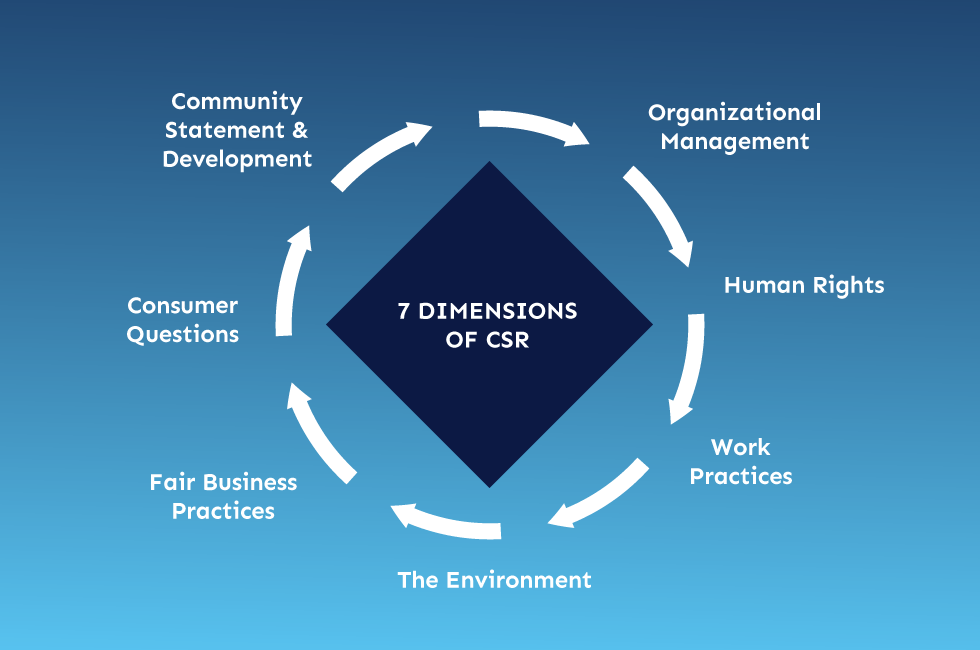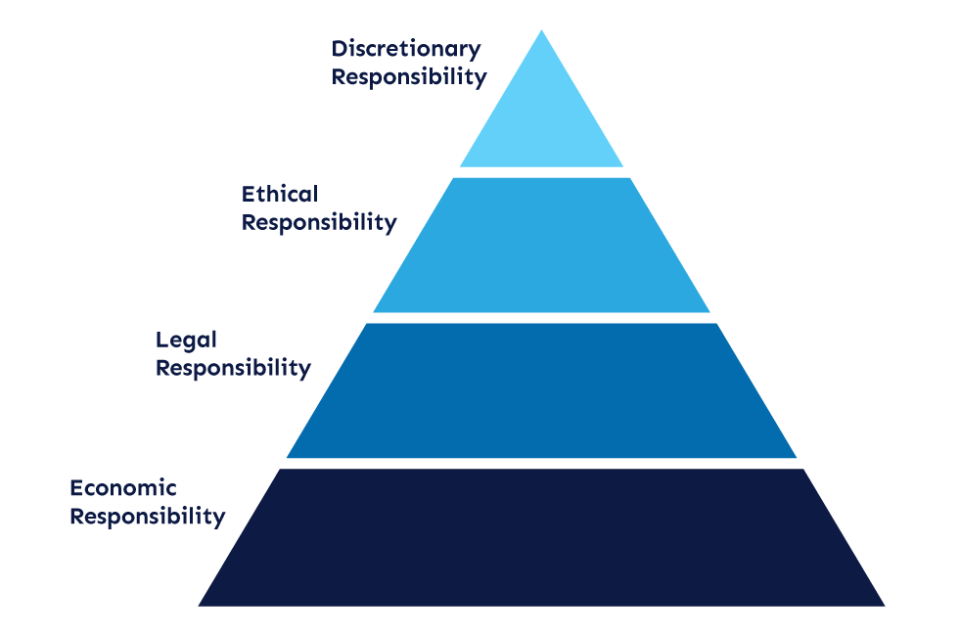In today's business world, Corporate Social Responsibility (CSR) has become a big deal. It's all about how companies handle their ethical and social duties toward society and the environment. It used to be optional, but now it's a crucial part of doing business. In a time when companies are watched closely and expected to do more than just make money, CSR is a fundamental part of their overall strategy. It's a way for companies to show that they care about doing the right thing, whether it's being ethical, supporting social causes, or being environmentally friendly. This not only boosts their reputation but also builds trust with their stakeholders, like customers and investors. So, businesses are no longer just about profit; they're also about making a positive impact in the world. It's a big shift in how businesses see their role in society.
OVERVIEW
Corporate Social Responsibility (CSR) is a concept that has gained significant traction in the business world over the past few decades. It refers to the ethical and moral obligations that individuals, organizations, and businesses have towards society and the environment. CSR involves making decisions and taking actions that not only benefit the entity but also have a positive impact on the broader community and the world.
The Four Dimensions of CSR
The CSR landscape can be understood through four main dimensions: economic, legal, ethical, and discretionary responsibility.
-
Economic Responsibility:
Economic responsibility is the foundational level of social responsibility. It involves businesses and organizations fulfilling their primary purpose, which is to generate profit and provide value to shareholders. This includes producing goods and services efficiently, creating jobs, and contributing to economic growth. While profit-making is essential, it should be done in a way that does not harm society or the environment. Economic responsibility sets the stage for a business's ethical journey by ensuring its financial viability.
-
Legal Responsibility:
Legal responsibility refers to an organization's obligation to comply with all applicable laws and regulations. This includes adhering to labor laws, environmental regulations, tax laws, and other legal requirements. Failure to meet these legal obligations can result in penalties and legal consequences. Legal responsibility sets the minimum standard for ethical behavior, ensuring that organizations operate within the boundaries of the law.
-
Ethical Responsibility:
Ethical responsibility goes beyond mere legal compliance. It involves conducting business in an honest, fair, and morally sound manner. Ethical behavior includes treating employees, customers, and stakeholders with respect, avoiding discrimination, and being transparent and truthful in all business dealings. Businesses may also engage in philanthropic activities and support social causes as part of their ethical responsibility, further contributing to a positive societal impact.
-
Discretionary Responsibility:
Discretionary responsibility is the highest level of social responsibility and involves voluntary actions that benefit society and the environment. Organizations that engage in discretionary responsibility go beyond what is expected by law or ethics. This may include charitable donations, community involvement, environmental sustainability initiatives, and social initiatives that align with the organization's values and mission. Discretionary responsibility represents the pinnacle of a company's commitment to societal well-being.
Seven Dimensions of CSR
Corporate Social Responsibility (CSR) is a multi-dimensional concept that encapsulates an organization's ethical and moral obligations to society and the environment. These dimensions help define the scope of CSR and guide businesses in fostering responsible practices. Here, we delve into the seven key dimensions of CSR (Figure 1) based on four main dimensions:
-
Organizational Management:
Organizational management within the CSR context involves a company's commitment to ethical leadership, governance, and transparency. It centers on responsible decision-making processes, the inclusion of CSR into the corporate strategy, and the establishment of mechanisms for accountability and ethical oversight. Companies embracing this dimension prioritize creating a culture of responsibility from the top down.
-
Human Rights:
Respecting human rights is a fundamental component of CSR. It involves ensuring that an organization's operations do not violate or compromise the rights and dignity of individuals. This encompasses issues like labor rights, freedom from discrimination, fair wages, and the prohibition of child and forced labor. Companies must take proactive measures to protect and promote human rights, both within their own operations and along their supply chains.
-
Work Practices:
Work practices within CSR emphasize creating a safe, inclusive, and fair workplace for employees. This dimension involves fostering a culture of diversity, equity, and inclusion, ensuring fair compensation and benefits, and prioritizing the well-being of employees. It also encompasses issues such as occupational health and safety, training and development opportunities, and work-life balance.
-
The Environment:
Environmental responsibility is a critical dimension of CSR. It involves a company's efforts to minimize its ecological footprint and protect natural resources. Initiatives may include reducing carbon emissions, conserving energy, minimizing waste, and adopting sustainable practices such as responsible sourcing and eco-friendly product development. Companies in this dimension aim to contribute positively to environmental sustainability.
-
Fair Business Practices:
Fair business practices are essential for maintaining integrity and trust within the business community. This dimension of CSR involves fair competition, ethical marketing, and adherence to anti-corruption measures. Companies committed to fair business practices engage in honest and transparent dealings with partners, suppliers, and competitors.
-
Consumer Questions:
Consumer questions in CSR revolve around providing accurate information, ensuring product safety, and addressing consumer concerns ethically. This dimension involves transparency in marketing, responsible advertising, and fair pricing. It also includes product quality, safety standards, and handling consumer complaints with respect and fairness.
-
Community Statement & Development:
Community engagement and development are integral aspects of CSR. This dimension entails an organization's commitment to being a responsible and active member of the communities in which it operates. Companies should support local initiatives, invest in community development programs, and address the specific needs of these communities, aligning their CSR efforts with societal expectations and local development priorities.

(Figure 1: 7 Dimensions of CSR)
Each of these seven dimensions contributes to a holistic CSR framework that goes beyond profit generation to encompass a company's broader role in society. By embracing these dimensions, organizations can actively promote ethical and sustainable business practices, thereby fostering trust, credibility, and a positive societal impact.
Importance of Corporate Social Responsibility (CSR)
Corporate Social Responsibility (CSR) is important for several reasons, as it has far-reaching benefits for businesses, society, and the environment. CSR is intricately connected to business in several ways. These connections highlight how CSR can have a significant impact on a company's operations, success, and overall business environment.
Here are some of the key reasons why CSR is important:
-
Improved Reputation:
Engaging in CSR activities can enhance a company's reputation and brand image. A socially responsible company is seen as trustworthy and credible, building trust with customers, investors, and the public.
-
Competitive Advantage:
Companies that embrace CSR often gain a competitive edge. Consumers and investors favor companies that demonstrate a commitment to ethical and sustainable practices, attracting like-minded stakeholders.
-
Risk Mitigation:
CSR practices can help mitigate various risks, including legal and regulatory risks. Proactively addressing social and environmental issues reduces the likelihood of legal challenges, fines, or reputation damage.
-
Enhanced Employee Engagement:
CSR initiatives boost employee morale and engagement, attracting and retaining top talent. Employees take pride in working for a socially responsible company.
-
Long-Term Sustainability:
CSR promotes sustainable business practices, reducing environmental impact, ethical sourcing, and responsible supply chain management. These practices ensure the long-term sustainability of both the business and the planet.
-
Stakeholder Relations:
CSR fosters positive relationships with stakeholders, including customers, employees, suppliers, and communities, which are crucial to a company's success.
-
Innovation:
CSR encourages innovation, leading to cost savings and new market opportunities as companies find more sustainable ways of doing business.
-
Positive Impact on Society:
CSR initiatives have a positive impact on society and the environment, supporting local communities, promoting social causes, and reducing the negative environmental footprint of the business.
-
Meeting Ethical and Moral Obligations:
Companies have an ethical and moral obligation to society and the environment. CSR helps fulfill these obligations by promoting responsible and ethical behavior.
-
Regulatory Compliance:
Many governments are implementing or considering regulations that require companies to report on their social and environmental practices. Engaging in CSR helps businesses meet these regulatory requirements more effectively.
Core Principles Guiding CSR Initiatives
Corporate Social Responsibility (CSR) is guided by a set of principles that help organizations incorporate social and environmental concerns into their business practices. While there are various interpretations of CSR principles, three fundamental principles often form the basis for CSR initiatives:
Triple Bottom Line (TBL) or 3P Principle:
The TBL principle emphasizes measuring success and performance in three dimensions: People, Planet, and Profit. This means that a company's success is gauged not only by its financial profitability but also by its impact on society and the environment.
-
•"People" refers to the company's commitment to social responsibility, including ethical practices, employee well-being, and contributions to the community.
- "Planet" highlights the company's environmental responsibility, focusing on sustainable practices, resource conservation, and reducing environmental impacts.
- "Profit" signifies that financial success remains important but should be achieved in a way that aligns with broader goals of social and environmental responsibility.
Stakeholder Engagement:
This principle underscores the importance of identifying and engaging with all relevant stakeholders who are affected by or can affect a company's operations. Stakeholders include not only shareholders but also customers, employees, suppliers, local communities, regulators, and others.
The principle encourages businesses to consider the perspectives, needs, and concerns of these stakeholders when making decisions and formulating CSR strategies. It aims to create a dialogue and build positive relationships with all stakeholders, ensuring that their interests are taken into account.
Voluntary Actions and Beyond Compliance:
CSR is often considered a voluntary initiative that goes beyond mere legal compliance. This principle emphasizes that businesses should not limit their social and environmental responsibilities to what is legally required but should proactively take steps to make a positive impact.
CSR initiatives should reflect a company's willingness to engage in ethical and responsible actions that are not mandated by law. Companies are encouraged to set their own standards and goals for contributing to society and the environment.
These principles guide companies in integrating CSR into their organizational culture and decision-making processes, promoting ethical, sustainable, and responsible business practices that benefit not only the company but also the broader community and the planet.
Sustainability, Accountability, and Transparency
In addition to the fundamental CSR principles mentioned above, there are three additional core principles that are integral to CSR initiatives:
-
1. Sustainability:
Sustainability is a core principle of CSR, emphasizing the long-term impact of business activities on the environment and society. It focuses on the responsible use of resources, reducing environmental harm, and promoting practices that can be maintained without depleting resources for future generations.
CSR initiatives related to sustainability may include reducing carbon emissions, adopting sustainable supply chain practices, promoting energy efficiency, and engaging in environmentally friendly product development.
-
Accountability:
Accountability in CSR involves taking responsibility for the consequences of a company's actions on all stakeholders, including employees, customers, communities, and the environment. It means being answerable for the company's impact and making efforts to mitigate negative effects.
CSR initiatives related to accountability may include ethical sourcing, adherence to labor and human rights standards, and a commitment to fair treatment of employees and suppliers.
-
Transparency:
Transparency is another key aspect of CSR, emphasizing open and honest communication about a company's social and environmental practices. It allows stakeholders to understand what a company is doing in terms of CSR and to hold it accountable for its claims and actions.
CSR initiatives related to transparency may include publishing sustainability reports, disclosing environmental impact data, and providing clear information about CSR efforts to customers and investors.
These three principles, Sustainability, Accountability, and Transparency, provide a framework for organizations to operate responsibly and ethically. They ensure that CSR initiatives are not only about improving the company's image but are also genuine efforts to make a positive impact on society and the environment. By adhering to these principles, businesses can build trust with stakeholders, enhance their reputation, and contribute to a more sustainable and ethical business landscape.
A Real-World Example of CSR Activities
An example of a social responsibility is a company engaging in philanthropic activities to support a charitable cause or community initiative. This type of social responsibility falls under the discretionary category and goes beyond legal and ethical obligations. Companies choose to undertake such activities to make a positive impact on society and demonstrate their commitment to giving back.
Company XYZ's Community Outreach Program:
Company XYZ, a successful technology company, decides to launch a community outreach program. They provide financial support, volunteer hours, and resources to a local school in an underprivileged neighborhood. The program includes:
-
Donations: Company XYZ donates funds to support the school's educational programs, such as buying books, computers, and educational materials.
-
Volunteer Initiatives: Employees of Company XYZ volunteer their time to tutor students, mentor them in areas like STEM (science, technology, engineering, and mathematics), and assist in organizing extracurricular activities.
-
Scholarships: The company establishes a scholarship fund to help underprivileged students pursue higher education by offering financial aid for college or vocational training.
-
Infrastructure Improvement: Company XYZ contributes to the renovation and improvement of school facilities, such as repairing classrooms, upgrading the library, and creating a safe and conducive learning environment.
-
Employee Engagement: Company XYZ encourages its employees to actively participate in community outreach activities, fostering a sense of social responsibility among the workforce.
This community outreach program is an example of discretionary social responsibility because the company is not legally obligated to provide these resources to the school. However, it reflects the company's commitment to making a positive social impact and enhancing the well-being of the local community. Such initiatives can lead to improved community relations, increased employee satisfaction, and a positive reputation for the company.
CONCLUSION
In conclusion, Corporate Social Responsibility (CSR) is not just a business trend but an essential commitment that influences an organization's success and its impact on society and the environment. By adhering to CSR principles, businesses can thrive financially while simultaneously contributing to the greater good. CSR encompasses economic, legal, ethical, and discretionary responsibilities, and it is rooted in principles of sustainability, accountability, and transparency. The integration of CSR into business operations represents a powerful force for positive change in the world.
QUESTION:
What are your thoughts on the subject above? Feel free to post a comment or start a discussion.
TAGS: Corporate Responsibility, Social Impact, Sustainability, Ethical Business, CSR Initiatives, Environmental Stewardship, Philanthropy, Stakeholder Relations, Accountability, Transparency, Triple Bottom Line, Business Ethics, Community Engagement, Sustainable Practices, Social Responsibility Programs, Ethical Leadership, CSR Benefits, Environmental Responsibility, Economic Growth, Legal Compliance, Social Innovation, Ethical Sourcing, Voluntary Actions, Social Impact Assessment, Reputation Building, Sustainable Development, Employee Engagement, Business and Society, Environmental Impact, Philanthropic Initiatives.






Leave A Comment